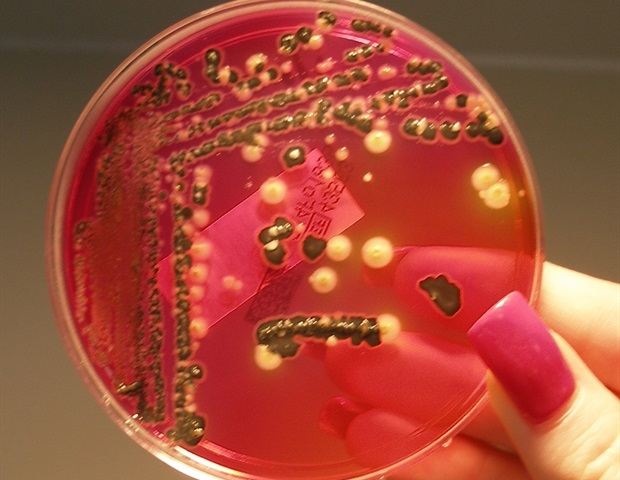Antibiotic-resistant Salmonella is a serious public health concern that has increased in recent years as the bacteria have developed ways to survive drugs. According to the U.S. Centers for Disease Control and Prevention, people can get Salmonella from eating contaminated food products or from infected people or animals – typically via unintentional contact with feces via touching hands or stroking a pet. However, a team of Penn State researchers have found that household dogs are an overlooked transmission point for zoonotic pathogens such as nontyphoidal Salmonella, which can cause diarrhea, fever and abdominal cramps, with some infections potentially having life-threatening complications.
The findings were made available online ahead of the next print edition of the journal Zoonoses and Public Health. Given the proximity of dogs to humans and the use of critically important antibiotics in companion animal medicine, the researchers reported, household dogs represent a risk for the spread of antimicrobial-resistant Salmonella. They explained that better awareness of the risk and proper hygiene could potentially help mitigate cross-species infections.
Salmonella infections in dogs can be clinical – showing signs or symptoms – or asymptomatic with numerous studies reporting Salmonella isolation from clinically healthy dogs, according to team leader Erika Ganda, assistant professor of food animal microbiomes, Penn State College of Agricultural Sciences. A major concern, she explained, is the closeness of humans and pet dogs that creates ample opportunity for Salmonella “zoonosis” – the disease transmitted to humans from animals – and pet-management decisions involving food contamination, improper food handling or both can increase the likelihood of infection.
To investigate antimicrobial-resistant Salmonella and the zoonotic potential of nontyphoidal Salmonella isolated from dogs and humans, the researchers leveraged existing biosurveillance infrastructure. Using the U.S. Food & Drug Administration's Veterinary Laboratory Investigation and Response Network, they identified all nontyphoidal Salmonella strains isolated from domestic dogs between May 2017 and March 2023.
Then they matched the timing and location of those 87 cases to strains isolated from humans in the National Center for Biotechnology Information database maintained by the National Library of Medicine at the National Institutes of Health, which provides access to biomedical and genomic information. They found 77 suspected zoonotic cases – meaning the bacteria moved from a pet dog to a human – comprising 164 strains, collected from 17 states in the United States.
Strains isolated from dogs included diverse serovars, or distinct variations within the species of bacteria, with most being clinically relevant to human health, the researchers reported. While the datasets did not contain information on severity of infection or treatments, the researchers did find that all identified strains possessed antimicrobial resistance genes for drug classes deemed critically or highly important by the World Health Organization.
“We identified 16 nontyphoidal Salmonella isolates from humans closely related to more than one of six dog-associated strains,” said Sophia Kenney, a student in the molecular, cellular and integrative biosciences doctoral program, and in the Department of Animal Science, who spearheaded the study. “Collectively, our data emphasize the importance of antimicrobial stewardship and sustained biosurveillance beyond human and agriculture-associated veterinary medicine, using a ‘One Health' framework, that accounts for all transmission points – including companion animals. One Health isan approach that recognizes that the health of people is closely connected to the health of animals and our shared environment.”
Antimicrobial stewardship in companion animal veterinary medicine is crucial for mitigating antimicrobial resistance within the One Health model, Kenney explained.
Especially with Salmonella, we think about the role of agriculture and transmission – we think about eggs, we think about beef. But the thing is, we don't let cows sleep in our beds or lick our faces, but we do dogs. We have this close bond with companion animals in general, and we have a really close interface with dogs. So, we asked the question: What's the role of companion animals in transmission of zoonotic disease like Salmonella, since they can get it. Salmonella infections in dogs are not common but we're aware of foodborne outbreaks related to pet treats or from contact with contaminated pet food and improper food handling.”
Sophia Kenney, a student in the molecular, cellular and integrative biosciences doctoral program
Study co-author Nkuchia M'ikanatha, lead epidemiologist for the Pennsylvania Department of Health and an affiliated researcher in Penn State's Department of Food Science, referred to an outbreak of multidrug-resistant Salmonella infections in people linked to pig ear pet treats in the United States a few years ago that sickened 154 people across 34 states.
“This reminds us that simple hygiene practices such as hand washing are needed to protect both our furry friends and ourselves – our dogs are family but even the healthiest pup can carry Salmonella,” he said. “Salmonella is a quintessential human microbe, its presence intertwined with our history since the dawn of agriculture. Emerging research suggests this pathogen may have shadowed humanity for some 10,000 years, coinciding with the rise of animal domestication. With nearly 40% of Pennsylvania households and over half of U.S. homes including dogs, we must respect the enduring threat of Salmonella and remain vigilant in preventing its spread within our families.”
Bacteria are never entirely “bad” or “good” – their role depends on the context, Ganda pointed out. While some bacteria, like Salmonella, can pose serious health risks, others are essential for maintaining our health and the health of our pets. It is important to remain vigilant and informed about potential risks, especially when living closely with animals, she added.
“At the same time, several studies highlight the significant physical and mental health benefits of owning a dog, including reduced stress and increased physical activity,” Ganda said. “Our goal is not to discourage pet ownership but to ensure that people are aware of potential risks and take simple steps, like practicing good hygiene, to keep both their families and their furry companions safe.”
This work was supported by funds from the U.S. Department of Agriculture, the U.S. Centers for Disease Control and Prevention, the National Institutes of Health and the U.S. Food and Drug Administration.









